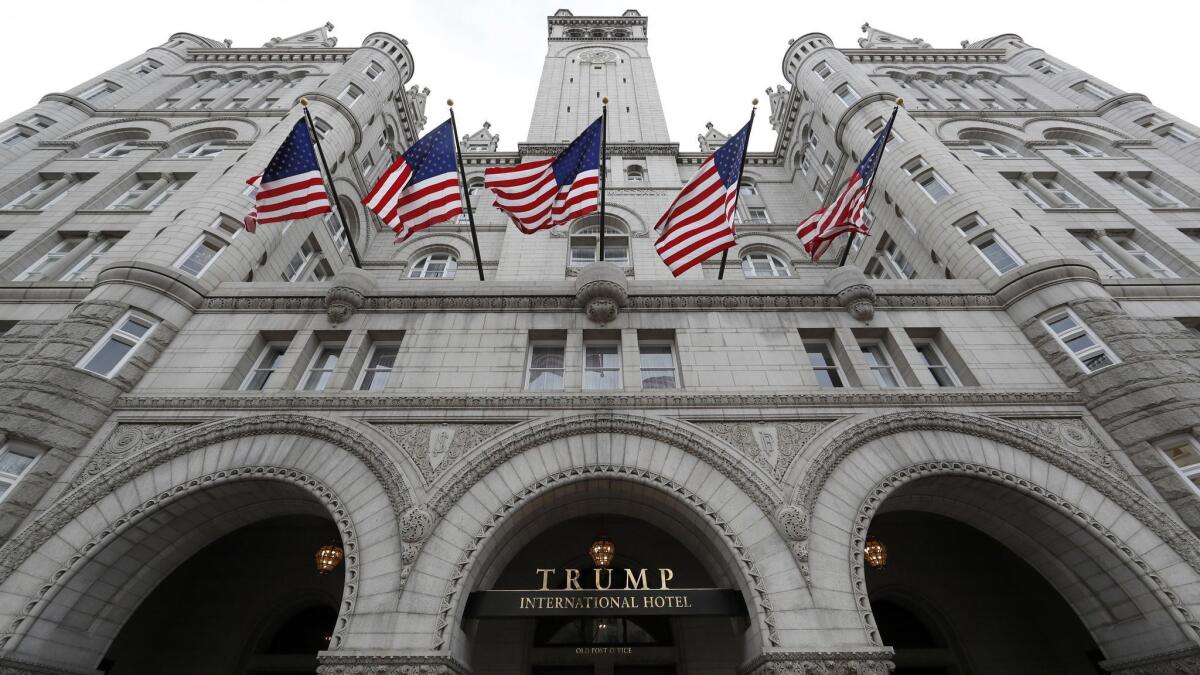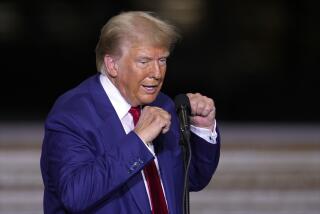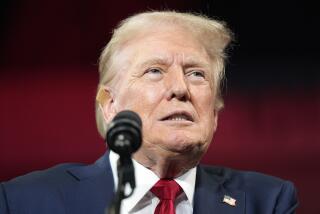Attorneys general subpoena Trump business records in lawsuit over his Washington hotel

- Share via
The attorneys general of Maryland and the District of Columbia are issuing subpoenas for financial records and other documents from more than a dozen of President Trump’s private entities Tuesday as part of an ongoing lawsuit alleging that the president’s business violates the Constitution’s ban on gifts or payments from foreign governments.
The subpoenas seek details on some of the most closely held secrets of Trump’s presidency: Which foreign governments have paid the Trump Organization money? How much? And for what?
All of the documents relate to Trump’s Washington, D.C., hotel, which is at the center of the emoluments case because of events foreign governments have held there and the federal lease that allows the business to operate.
In addition to documents from more than a dozen entities related to the president’s company, including the trust that holds his personal assets, Maryland Atty. Gen. Brian Frosh and District of Columbia Atty. Gen. Karl Racine, both Democrats, are seeking documents from managers of the Walter E. Washington Convention Center and a slew of competing Washington hotels as part of an effort to try to show Trump’s property is unfairly siphoning business from competitors, according to the two attorney generals’ offices.
Also receiving subpoenas are a number of federal agencies that may have some information about Trump’s hotel, which operates in the federally owned Old Post Office Pavilion on Pennsylvania Avenue downtown. At the top of the list is the General Services Administration, which leases the property to Trump’s company.
Other agencies receiving subpoenas are the Commerce Department, the Defense Department, the Agriculture Department and the Treasury Department. The state of Maine also received a subpoena due to a visit Gov. Paul LePage made to the hotel in early 2017.
The Justice Department and Trump Organization did not immediately respond to requests for comment.
Since Trump won the 2016 election, his hotel in Washington has hosted events put on by the embassies of Kuwait, Bahrain and the Philippines — all U.S. allies. The Saudi government spent at least $270,000 to reserve hotel rooms and banquet rooms at the D.C. hotel, according to foreign lobbying records. And at Trump’s hotel in New York, the general manager credited travelers accompanying the Saudi Crown prince for spending so much money this spring that they helped the hotel turn a profit for the quarter.
But those transactions, which were discovered by reporters, may not be the only ones. Neither the Trump Organization nor the Trump White House have provided any comprehensive accounting of which foreign governments have paid money to the president’s businesses — and, by extension, to the president who still owns them. Nor have they said what these countries paid for, which might address concerns that they might be overpaying for services to curry favor with Trump.
Now, after nearly two years of litigating, the attorneys general have filed formal requests for this data. Their argument: The Constitution’s emoluments clause was designed to prevent the public from being left to wonder if the president had unseen business relationships with foreign powers.
The subpoenaed documents could lead to interviews with top officials within the Trump organization. The GSA, for example, receives monthly reports from the Trump Organization detailing the hotel’s costs and revenue.
The plaintiffs are also seeking tax records related to the president’s business, though they did not request the president’s personal tax returns.
It is unclear how much of the information — even if it is entered into the court record — may be released to the public. Many of the documents being sought by the plaintiffs are held by third-party hotel operators.
U.S. District Judge Peter Messitte in Greenbelt, Md., this summer allowed the lawsuit to move forward in the case, which alleges the president is violating the emolument clauses of the Constitution by continuing to do business with foreign governments.
As part of their case, Racine and Frosh must show that similar venues, such as the convention center, lost business because of competition from the Trump Hotel.
Justice Department attorneys have repeatedly sought to delay the case to prevent or at least put off discovery, a process in which attorneys can seek documents and depositions in the case. In court filings, the attorneys have argued that the president has not received emoluments, that D.C. and Maryland do not have standing to bring such action, and that the judge should dismiss the case.
Recently the Justice Department asked Messitte to stay the case and allow a higher court to intervene, a request he denied last month, instead ordering the plaintiffs to submit a schedule for discovery.
The agency’s attorneys again asked Messitte for a stay Friday, in the hope that the U.S. 4th Circuit Court of Appeals would intervene.
Messitte has limited discovery to information related to the president’s D.C. hotel. This is the second civil case in which Trump’s business is now subject to discovery, after Trump agreed to produce portions of his calendar from 2007 and 2008 in a defamation lawsuit brought by former “Apprentice” contestant Summer Zervos.
Separately, the judge has not yet ruled on the president’s request to dismiss the lawsuit against him in his private, unofficial capacity. Trump’s personal lawyers renewed their request in a new filing on Monday for a ruling before the parties begin the discovery process.
The president, his attorneys say, should not be burdened with negotiations over documents and records if the complaint against him could ultimately be dismissed.
“The President, in turn, will be drawn into the inevitable disputes that will arise as discovery progresses,” wrote Trump’s lawyer William Consovoy. “The President will suffer the very burdens from which absolute immunity is supposed to shield him.”
A second emoluments case, brought by 198 congressional Democrats, could open the president’s company to discovery beyond the Washington, D.C., hotel. A district judge in D.C. has so far allowed that case to proceed.
Trump resigned from his business when he entered the White House but still owns it and can benefit from it financially. His sons Donald Trump Jr. and Eric Trump now run the company.
O’Connell, Marimow and Farenthold write for the Washington Post.
More to Read
Sign up for Essential California
The most important California stories and recommendations in your inbox every morning.
You may occasionally receive promotional content from the Los Angeles Times.













